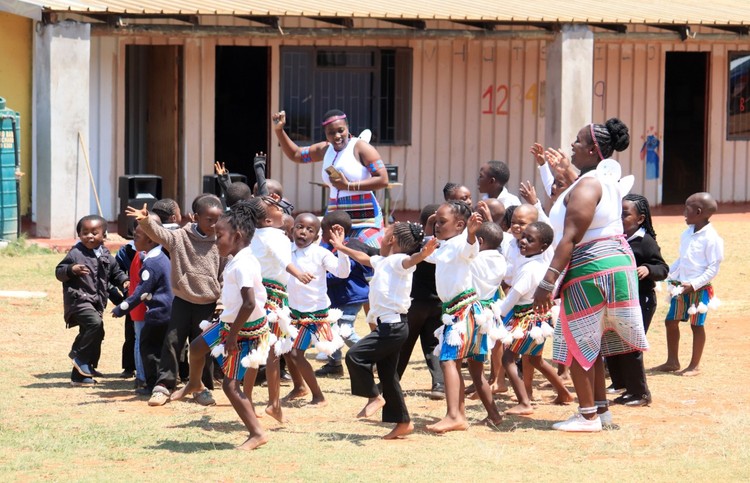Vhutshilo Mountain School offers lifeline to AIDS orphans
Limpopo school has been going strong for nearly 20 years
Vhutshilo Mountain School learners danced at a celebration to mark the 50th wedding anniversary of two of the school’s loyal donors, Monica and Les McNeill. Photos: Thembi Siaga
- Vhutshilo Mountain School in Limpopo, founded by a factory worker, has been looking after AIDS orphans since 2002.
- The school, launched with funds from the Church of Scotland, currently accommodates about 130 learners.
- At the beginning of the month the school honoured two Scottish donors – Monica and Les McNeill – who visited the school for their 50th wedding anniversary.
The Vhutshilo Mountain School in Tshikombani village, about 30 km west of Thohoyandou in Limpopo, has been looking after HIV/AIDS orphans since 2002.
The school was founded by Sue Ann (Suzi) Cook, a factory worker from Shayandima. She noticed the plight of women, particularly grandmothers, who could not go to work because they had to care for children whose parents had died of AIDS. This was before antiretroviral (ARV) treatment was widely available. Cook was especially concerned about the young children who needed daytime care.
Cook transformed the caravan she lived in at Thathe Vondo into a pre-school, resigned from her job and started caring for the children, helping with transport, meals, clothing and medical care. She launched a gardening programme to provide fresh vegetables, distributed food parcels to families, and established the village’s first paediatric ARV programme.
Her work caught the attention of Professor Fraser McNeill, head of the anthropology department at the University of Pretoria. McNeill was conducting research on HIV/AIDS-related issues.
“Grandmothers were under stress as they had to work while taking care of sick children. It was difficult for them to administer the children’s medication regularly, and some were forgetting,” McNeill said.
McNeill shared the story of the school with his church congregation in Scotland, asking them to raise funds. In 2005, the Inverclyde congregation of the Church of Scotland built a two-classroom school at Tshikombani.
Among those who have supported the school over the years are Monica McNeill and her husband, Les. At the beginning of the month the couple visited the school from Scotland to mark their 50th wedding anniversary. A signboard was unveiled, acknowledging the Church of Scotland and specifically the McNeill family for their contributions.
Over the years, countless success stories have emerged from the Vhutshilo Mountain School, with many former students pursuing higher education and successful careers. Many return to mentor current pupils.
The school currently accommodates 130 pupils, ranging from toddlers aged one to three to Grade 2 pupils (aged seven to eight years).
Since its official opening in 2005, the school has also started admitting other learners who pay school fees, helping to break the stigma surrounding HIV/AIDS. Most of the children come from nearby villages such as Dopeni and Fondwe.
The school offers a range of programmes including psychosocial support services, counselling and peer support groups to help children cope with the loss of their parents and the stigma associated with HIV/AIDS.
Khathu Nemafhohoni, the school’s director, said the school’s role extends beyond education. Staff also visit the children at their homes. She said shortages of funds limit the school’s ability to accommodate more children.
Cook died in 2018. “Suzi started with nothing. The Church of Scotland built on her inspiration,” said McNeill.
A sign unveiled for their wedding anniversary acknowledges the support of the McNeills over the years.
Support independent journalism
Donate using Payfast

Don't miss out on the latest news
We respect your privacy, and promise we won't spam you.
Next: How business can help end homelessness
Previous: Relocation of Langa rail line occupiers delayed by regulations
© 2024 GroundUp. This article is licensed under a Creative Commons Attribution-NoDerivatives 4.0 International License.
You may republish this article, so long as you credit the authors and GroundUp, and do not change the text. Please include a link back to the original article.
We put an invisible pixel in the article so that we can count traffic to republishers. All analytics tools are solely on our servers. We do not give our logs to any third party. Logs are deleted after two weeks. We do not use any IP address identifying information except to count regional traffic. We are solely interested in counting hits, not tracking users. If you republish, please do not delete the invisible pixel.


